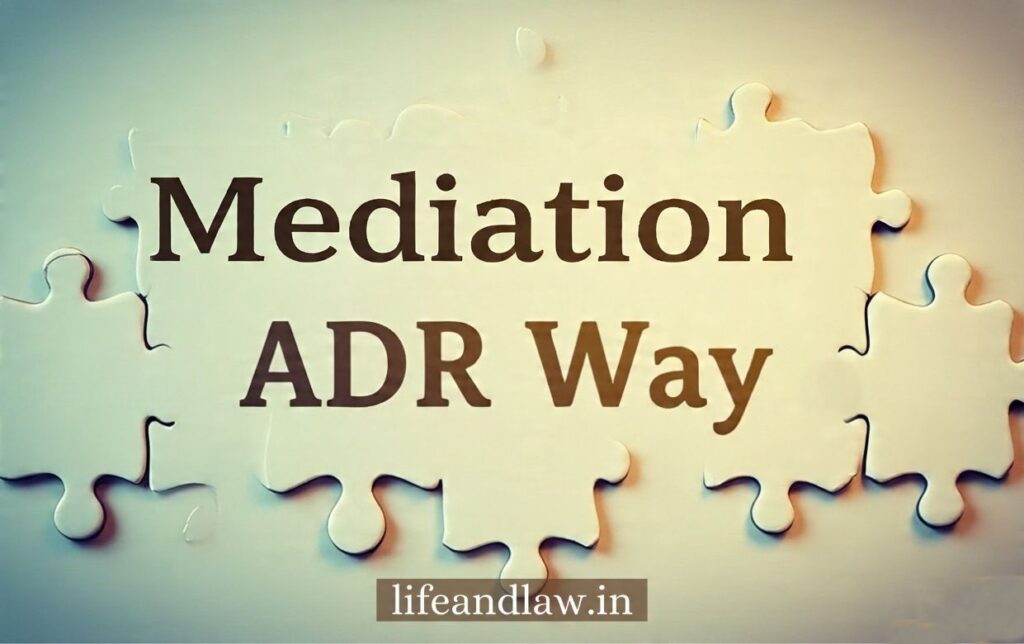Trending

Disputes and disagreements are an essential aspect of civilization. Differences of opinion can emerge in a variety of sectors, including business agreements, family problems, property disputes, and political matters. In such cases, the court process can be time-consuming and costly. Many cases remain unresolved for years, causing mental and financial strain on the parties involved. This has increased the importance of alternative dispute resolution methods that are faster, more effective, and based on mutual consent.
Mediation is one such excellent alternate option that is more peaceful and adaptable than traditional judicial proceedings.
In this article, we’ll look at many facets of the mediation process.
Mediation is a voluntary, informal, and cost-effective method for resolving disputes with the assistance of a neutral mediator. Instead of imposing a decision like a judge, the mediator assists both parties in reaching a mutual agreement, making it ideal for maintaining relationships and encouraging collaborative solutions.
Mediation can take many distinct forms, each tailored to a specific situation:
A mediation agreement is a written, legally binding instrument signed by both parties that expresses their intention to resolve conflicts through mediation. It can be used on its own or as part of a bigger contract, and it can be electronically validated under the IT Act of 2000. Such agreements apply before or after problems emerge, and they mostly address business difficulties in international instances.
The Mediation Act of 2023 states which types of conflicts cannot be handled through mediation. This includes:
Criminal charges or offenses.
Issues involving minors or mentally disabled people.
Professional misconduct cases (e.g., lawyers and doctors).
Cases impacting third-party rights, excluding matrimonial cases involving children.
The National Green Tribunal handles environmental and industrial disputes.
Taxation and revenue are important.
Regulatory and competitive disputes (e.g., TRAI, SEBI).
Land-acquisition and compensation disputes.
Any case determined ineligible by government notification.
Mediation is typically conducted within the jurisdiction of the court where the dispute may be resolved. However, if both parties agree, mediation can be held elsewhere or online. Nonetheless, enforcement remains subject to the original court’s authority.
Mediation begins when one party sends a notice for mediation (if there is an existing agreement) or when a mediator accepts the appointment (if there is no agreement).
The process must be open and fair. The mediator maintains a neutral stance and assists both parties in having meaningful conversations. Formal legal procedures do not apply, and all discussions are kept strictly confidential.
A mediator just facilitates discussion. They cannot impose answers, but they can help parties comprehend each other’s points of view and consider potential compromises.
A mediator cannot later function as a witness, lawyer, or advisor in the same case in order to maintain objectivity and confidence.
Mediation must be completed within 120 days, with an optional extension of 60 days by mutual consent. This guarantees that the process does not cause unnecessary delays.
If the mediation is successful, both parties must sign a written agreement, which is then validated by the mediator. In institutional mediation, it is given to the mediation service provider.
This agreement must be registered with the court or legal body within 180 days, however deferred registration is permitted for a fee.
If mediation fails, a Non-Settlement Report is created without assigning blame or disclosing details.
All mediation contact is private and inadmissible in court, save in circumstances involving criminal threats, domestic violence, or risks to public safety.
Mediation concludes with:
A successful settlement.
The mediator declares that resolution is impossible.
Any party can withdraw, or
The time restriction has expired.
Mediation costs, including mediator fees and service charges, are split evenly between the two parties.
Lok Adalat and Permanent Lok Adalat processes are unaffected by the Mediation Act.
14. Enforcement (Section 27)
The settlement agreement is binding and enforceable like a court decree.
Mediation is a time-saving, cost-effective, and efficient alternative to traditional court proceedings. The Mediation Act, 2023 has established a legal framework that strengthens the credibility and structure of the process. It promotes an environment of dialogue and cooperation over hostility.
As public awareness rises, mediation is projected to play an increasingly important role in lowering court workload and providing faster results. Parties should explore mediation as a first step in conflict resolution, whether through legal representation or on their own initiative. Consultation with legal professionals like Adv. Abdul Mulla through platforms such as www.asmlegalservices or www.lifeandlaw.in can be extremely advantageous.
Mediation is suitable for personal, commercial, and international disputes, making it a generally applicable option.
Adv. Abdul Mulla (Mob. No. 937 007 2022) is a seasoned legal professional with over 18 years of experience in advocacy, specializing in diverse areas of law, including Real Estate and Property Law, Matrimonial and Divorce Matters, Litigation and Dispute Resolution, and Will and Succession Planning. read more….
Copyright BlazeThemes. 2025